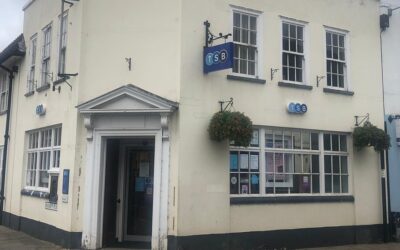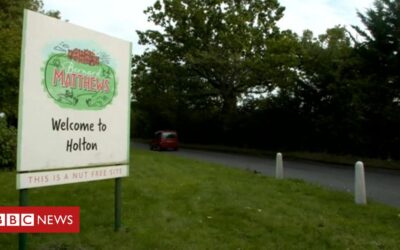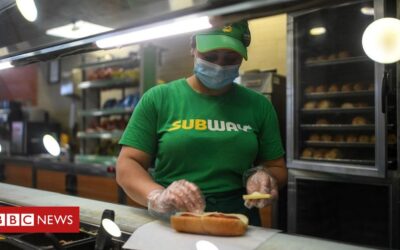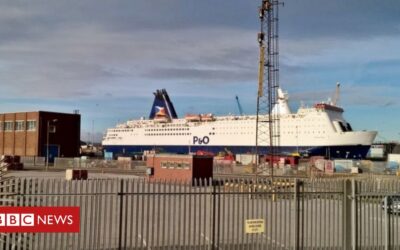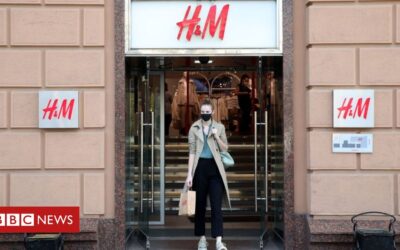By Rachael McMenemy and Mariam IssimdarBBC NewsThe TSB branch in Hadleigh, Suffolk is one of 164 set to go as the bank cuts 900 jobs. What does it mean for a town when a bank closes?Dr Sian Dawson can see the Hadleigh TSB from where she lives.The bank, she says, is essential for her podiatry clinic business.”This is going to be a nightmare,” says Dr Dawson. “I can’t believe it.”Although Hadleigh has an Ipswich Building Society, the nearest bank following the closure will be a 20-minute drive away in Ipswich or Sudbury.”I will close my TSB account if they leave Hadleigh,” she says. “It won’t be convenient to stay with them for the business.”Dr Dawson, 41, who is also a local Conservative district councillor, praised the staff at the bank.She says: “It’s such a brilliant branch.”It’s crazy really to think this is happening. So many of my clients pay by cheque, so I rely on the bank service.”Hadleigh, with a population of about 8,000, is known as one of Suffolk’s “wool towns” – a reference to the cloth industry that led to much of its wealth.Its High Street mainly consists of independent shops and has many distinctive timber-framed buildings. This is not the first time Hadleigh has lost a bank in recent times – Barclays closed three years ago and the building has yet to be sold.Muriel Wasp and her husband Paul Wasp say most people transferred their banking to TSB at that time.”I’m very sad for the older generation. A lot of them go in there to have a little chat. It’s another part of Hadleigh life gone,” says Mrs Wasp. Her husband Paul adds: “Many within Hadleigh, I think, still haven’t got the internet, don’t own a computer. So what are they going to do?”Their friend Neil Henderson, who works for Hadleigh Town Football Club, says the club still handled a lot of cash transactions and was unsure how it would be affected. Sylvia Nudds, 77, who lives in nearby Dedham, in Essex, arrived at Hadleigh’s TSB on Thursday morning to use its cash machine. She was shocked to hear it was closing. “We have to go to two other villages to get any money at all. It’s going to annoy me,” she says.”I swapped from Barclays [to TSB] because they were closing.”Unfortunately, the less shops there are, the more a town declines. We just come in for the bank really, which is quite a way.”Julie Towells, who owns Ferguson’s Delicatessen, says she used TSB to get change for her tills. “Now I can’t get change from anywhere,” she says.”For health reasons, we use card but for economical reasons we use cash. As a small business, we’re penalised using a card as we have to pay a transaction fee.”I suppose using card is what most people do, but the elderly are going to struggle. They still like to use cash. We’ve had to guide so many through and show them how to scan.”The building society in Hadleigh does not offer standard current account or card-based transactions.Postmaster Jeremy Brown describes the closure as “very sad” and said the town’s Post Office only offered “basic banking facilities”.”I don’t want it to go, or for any company to go. But most shops in Hadleigh are independents so it won’t be the death knell of the High Street,” says Mr Brown. Melissa Baxter, manager of the Eight Bells pub, said using the Post Office would mean transactions take longer to reach accounts. “Nothing will be as quick as just depositing in the bank down the road,” she said.Robin Bulloch, customer banking director at TSB, says: “We are working to ensure the transition towards digital, which is being seen right across the economy, is handled sensitively and pragmatically for our colleagues and customers. “We’re taking steps to support vulnerable customers and those in rural locations.” The company said 94% of TSB customers would not have to travel more than 20 minutes to a different TSB. A full list of TSB banks affected can be found here. Find BBC News: East of England on Facebook, Instagram and Twitter. If you have a story suggestion email [email protected] TopicsHadleighUK bankingTSB BankBankingMore on this story
BBC Business News Articles
Company boards 'must have at least one BAME member'
The biggest UK firms should have at least one black, Asian, or minority ethnic (BAME) member on their boards by 2021, business group the CBI has said. Backed by companies such as Microsoft and law firm Linklaters, it said firms needed to set “clear and stretching targets” to improve diversity. Currently more than a third of FTSE 100 firms do not have ethnic minority representation at board level.The CBI said progress had been “painfully slow”.The industry group said research from consultants McKinsey showed that companies with more gender and ethnic diversity were likely to be more profitable than their peers.However, many of the biggest FTSE-listed companies had failed to boost diversity at the top, despite government recommendations made back in 2016.The CBI said companies now needed to publish tougher targets for themselves within 12 months.It called for FTSE 100 firms to have at least one racially and ethnically diverse board member by the end of 2021, and for smaller FTSE 250 firms to have the same representation by 2024.And it urged them to foster “transparent dialogue” with employees, offer more mentoring and support, and work with a more diverse set of suppliers, including minority-owned businesses. Lord Karan Bilimoria, the first president of the CBI from an ethnic minority, said: “The time has come for a concerted campaign on racial and ethnic participation in business leadership. Progress has been painfully slow.”‘No action’Hugh Milward, general manager for corporate external and legal affairs at Microsoft UK, said: “We are on a journey to increasing diversity across Microsoft, and in particular at our most senior levels. “But when more than a third of leading organisations still don’t have any ethnic minority board representation, the pace of chance is too slow. Without commitment, there is no action.”Richard Houston, UK boss of consultancy Deloitte, said the Black Lives Matter movement had “given a fresh sense of urgency around racial diversity in business”.The movement, which began in 2013, became a global phenomenon after black man George Floyd was killed by US police officers earlier this year. On Wednesday, the state of California in the US signed into law a bill requiring public companies to name at least one minority or LGBTQ director to their boards by the end of 2021.
Covid-19: Bernard Matthews outbreak plant offers free bus travel
Bernard Matthews, which employs 1,000 people at the plant, said it believed the cases were linked to car-sharing.
Cambridge University to cut fossil fuel investments by 2030
At the same time, its £3.5 billion endowment fund will “ramp up” investments in renewable energy.
Subway rolls ruled too sugary to be bread in Ireland
The rolls used in Subway’s hot sandwiches contain too much sugar to be considered bread, according to Ireland’s Supreme Court.Ireland’s highest court made the ruling in a case about how the bread is taxed.An Irish franchisee of the US company had claimed it should not pay VAT on the rolls it uses in heated sandwiches.But the court ruled that because of the level of sugar in the rolls they cannot be taxed as bread, which is classed as a “staple product” with zero VAT.Under Ireland’s VAT Act of 1972, ingredients in bread such as sugar and fat should not exceed 2% of the weight of flour in the dough.Are there good and bad sugars?The five judges, who were considering an appeal by Bookfinders Ltd, a Subway franchisee based near Galway, concluded that in Subway sandwiches the sugar content is around 10% of the flour in the dough for both white and wholegrain rolls.”Subway’s bread is, of course, bread,” said a spokesperson for Subway. “We have been baking fresh bread in our stores for more than three decades and our guests return each day for sandwiches made on bread that smells as good as it tastes.” In Irish law, bread is considered a staple food and has a zero rate of VAT. Following the ruling, the rolls are subject to tax at 13.5%.The case stems from a decision by Ireland’s tax authority in 2006 to refuse Bookfinders’ request for a refund on VAT payments made between 2004 and 2005. After an appeal commissioner upheld the tax authority’s refusal of a refund, Bookfinders took its case to the High Court which it lost before going to the Court of Appeal, where it was also unsuccessful. It is not the first time Subway’s bread has been in the spotlight. In 2014, the company announced it was removing azodicarbonamide – the so-called “yoga mat” chemical – from its rolls. The chemical is used to whiten flour and improve the condition of dough. It is also used to make vinyl foam products such as yoga mats and the underlay for carpets.Subway stopped using the agent six years ago but the US Food and Drug Administration continues to approve the use of the chemical in produce.
KitKat: Petition delivered to Nestle opposing Fairtrade removal
image copyrightReutersMore than 300,000 people have signed petitions delivered to Nestle in protest at its move to stop using Fairtrade cocoa and sugar in KitKats.The chocolate wafer bar has been a flagship product of Fairtrade for a decade, but Nestle is cutting links with the non-profit organisation.The Fairtrade Foundation said the move was “devastating” for thousands of cocoa farmers in the Ivory Coast. Nestle said it will source KitKat cocoa on Rainforest Alliance terms.The petitions were handed in at its UK KitKat factory in York, to coincide with the start of the annual cocoa harvest in the Ivory Coast. image copyrightDanny Lawson/PAThe firm already uses Rainforest Alliance-certified farmers on other bars such as Aero and Yorkie.The Fairtrade Foundation said vulnerable cocoa farmers would lose out on around £1.37m a year in premium payments, and would have less control over how they spend their money. Sugar farmers will lose more than £500,000 in annual premium payments, it added.image copyrightReutersJoanna Pollard, co-ordinator of Fairtrade Yorkshire, who started a petition which has gathered 284,000 signatures, said: “As soon as I heard the news that KitKats would no longer be Fairtrade, I knew this would be devastating for thousands of farmers.”Under the Fairtrade system, they have a seat at the table and make their own decisions about where their money is spent. The farmers I’ve spoken to feel that selling their crop on Fairtrade terms is vital for their communities.”‘Listened to farmers’A further 20,000 people also signed a second petition started independently by the Co-operative Party.Nestle said it asks those who have signed the petitions to look at the mission of Rainforest Alliance and the work the company is doing through its Nestle Cocoa Plan.”We want to help further improve the lives of cocoa farmers through a number of different initiatives and by increasing our overall investment in sustainable cocoa,” a spokesperson said.”Before we made this decision, and throughout our notice period with Fairtrade, we have listened carefully to farmers.”We have used their input to create a comprehensive package to support their needs through the transition.”Follow BBC Yorkshire on Facebook, Twitter and Instagram. Send your story ideas to [email protected] or send video here.Related TopicsChocolateYorkMore on this story
Blackbaud: Bank details and passwords at risk in giant charities hack
By Leo KelionTechnology desk editorimage copyrightGetty ImagesBank account information and users’ passwords are among details feared stolen by hackers in a security breach at a service used to raise donations from millions of people.Many UK universities and charities, as well as hundreds of other organisations worldwide, use the software involved.Its developer Blackbaud made the admission in a regulatory filing.The firm previously said the theft had been limited to other personal data – but not payment details.It added it was contacting affected clients. They, in turn, will need to send follow-up alerts to at least some of the donors they had already contacted about the incident. “We have informed the small subset of Blackbaud customers who were part of this development,” the company told the BBC.”We apologise that this happened and will continue to do our very best to supply help and support as we and our customers jointly navigate this cyber-crime incident.”The BBC has learned that some of the organisations believed to have been impacted by the latest development include:the University of Birminghamthe National Trust”We are aware that some financial data may have been accessed as a result of the data breach and are working with Blackbaud to determine if this affects us,” said a spokesman for the National Trust.image copyrightReutersMillions of people worldwide have been warned they could have been affected in the original alerts sent out about the attack over recent months.A spokeswoman for the Information Commissioner’s Office told the BBC: “Our investigation is ongoing and we will be making further enquiries regarding the latest developments.”The ICO said it knew of 166 UK organisations that had been affected by the security breach.They include dozens of universities as well as health-related charities, schools and trusts set up to care for historic buildings.International clients who were affected also included hospitals, human rights organisations, non-profit radio stations and food banks.’Not acceptable’South Carolina-based Blackbaud said the new findings did not apply to all clients affected by the hack, but acknowledged that, in some cases, the payment information involved had not been digitally scrambled, as might have been expected.”Further forensic investigation found that for some of the notified customers, the cyber-criminal may have accessed some unencrypted fields intended for bank account information, social security numbers, user names and/or passwords,” its filing said.image copyrightGetty Images”In most cases, fields intended for sensitive information were encrypted and not accessible.”An updated security notice on the firm’s site added that the firm did not believe credit card details had been exposed.One cyber-security expert said it was essential that affected donors be told as soon as possible.”It’s simply not acceptable to store financial data, and passwords, in an unencrypted form,” said Prof Alan Woodward from the University of Surrey.”This latest revelation means that whereas their customers relied upon their initial statements to reassure people that banking information was not affected, that has now to be potentially reversed.”Legal claimsThe hack occurred in May and was first disclosed to the public in July.At the time, Blackbaud said it had paid the attackers a ransom and believed the thieves had subsequently destroyed the stolen data.Paying a ransom in such circumstances is not illegal, but goes against the advice of numerous law enforcement agencies, including the FBI, NCA and Europol.A banking security news site reported last week that Blackbaud faces at least 10 lawsuits in the US over the matter.Related TopicsCharitiesCyber-crimeCyber-securityCyber-attacksUnited StatesMore on this story
P&O cuts ferry services as demand falls
Ferry operator P&O Ferries is to scrap its route between Hull and Belgium due to a sharp drop in demand because of coronavirus. It is understood the number of services between Dover and Calais will also be reduced and 140 jobs are at risk across the company.The RMT union said it was working with the ferry operator to protect jobs.P&O said due to the “extended impact of Covid-19” it was taking “difficult action” in making redundancies.The route connecting Hull with Zeebrugge in Belgium has been described as loss-making and is expected to close in the next few monthsThe scrapping of the route means the Pride of York and the Pride of Bruges vessels will be taken out of service. The Dover to Calais crossing will continue to operate, but will be reduced from six ferries to four, with the freight ferry European Seaway and the Pride of Burgundy being stopped.In a leaked consultation document sent to staff earlier this week, the company said a fall in tourist demand due to the pandemic and ongoing Brexit uncertainty were to blame.Darren Procter, national secretary for the Rail, Maritime and Transport (RMT) union, said the Hull to Zeebrugge crossing had been a “challenging route for a number of years” and the pandemic had compounded the problem.He added: “The Pride of York is an ageing vessel and because of the future financial costs P&O made the decision to cut their losses.”Mr Proctor said scrapping the route would have a wider economic impact on Hull.”The individuals travelling on these vessels will use local amenities, they might have a pub meal or stay in a hotel so it’s going to have a knock on effect.”Obviously Hull has a rich maritime heritage and a lot of industry connected to the sea so it’s a shame it’s going.”The Pride of York has not been running since the pandemic while the Pride of Bruges had returned to operation for a short period of time. Read more stories from across Hull and East YorkshireMr Proctor said the two affected ferries on the Dover to Calais route had not been in operation for some time and were both laid up in the Port of Leith in Edinburgh.A spokesperson for P&O said: “Due to the extended impact of Covid-19, we are having to take further difficult action in which some jobs will be made redundant – but as a result thousands more jobs will be saved. “These necessary steps will ensure we are a slimmer and more agile business that is better able to give customers the service they want and the value they demand.”Earlier this year the ferry operator was criticised for announcing 1,100 job cuts after taking advantage of the government’s furlough scheme.
Coronavirus: H&M to close 250 shops as Covid drives sales online
The world’s second biggest fashion retailer, Sweden’s H&M, says it plans to cut 250 of its stores globally.The closures will come next year after the firm said the Covid-19 pandemic had moved more shoppers online.Although it said sales had continued to recover in September, they were still 5% lower than the same month in 2019.The firm has 5,000 stores worldwide, but it is not yet clear how many closures will be in the UK.It said it was “too early for us to give any details on this, the numbers will differ from [national] market to market”. H&M has the contractual right to renegotiate or end leases on about a quarter of its stores every year. The retailer said that it planned a “net decrease of around 250 stores” next year.While its pre-tax profits fell to 2.37bn Swedish krona (£210m) for the nine months to 31 August, this was better than analysts had expected.However, it said 166 of its stores worldwide remained closed, and a large number still had local restrictions and limited opening hours.High Street stores hitAnalyst Richard Lim of Retail Economics told the BBC: “What we have seen generally over the past few months of the pandemic has been a step change in the number of sales going online.”That has affected all parts of the industry, but particularly clothing and footwear.”Thousands of retail jobs unviable, Next boss warns
Nike expects permanent shift to online sales
He also said that in terms of consumers physically visiting stores to do shopping, there had been a move from High Streets and shopping centres towards retail parks.”People can go in their cars instead of using public transport, and they are also able to buy in bigger bulk at retail parks,” Mr Lim said. ‘Worst is behind us’H&M said it would now accelerate its plans to increase digital investment to cope with growing online demand.The Stockholm-based firm said it had taken “rapid and decisive action” to manage the impact of the coronavirus, including changes to purchasing, investments, rents, staffing and financing.Chief executive Helena Helmersson added: “Although the challenges are far from over, we believe that the worst is behind us and we are well placed to come out of the crisis stronger.”Sofie Willmott, from analytics firm GlobalData, pointed out that H&M’s sales in September “fell just 5% demonstrating the relevance of its product offer as shoppers start to feel more confident returning to stores”.But she said the firm “must enhance its online proposition given the importance of digital channels, to succeed in a very tough market”.In addition, Ms Willmot said H&M should consider “more significant changes” with regards to shop closures, or it will “continue to be hindered by its excessive store estate”.
Covid: Rolls-Royce announces plan to raise £3bn
Rolls-Royce has announced it will seek to raise £3bn to bolster its finances after a “sharp deterioration” in civil aerospace because of the pandemic.The plane engine maker will tap shareholders for £2bn through a rights issue and the remainder will come from issuing new bonds.There has been speculation for weeks that Rolls-Royce will seek funding.The company has been severely affected by the slowdown in air travel because of coronavirus.The rights issue could unlock a further £1bn from UK Export Finance, the government’s trade finance body. Rolls-Royce has already borrowed £2bn from the state.However, Rolls-Royce said an extension of a government loan was dependent on both UK Export Finance and HM Treasury approving the terms of the rights issue. “There is therefore no guarantee that this increase will take place,” it said.The government holds a “golden share” in Rolls-Royce which prevents the company – which is deemed to be of strategic interest to the UK – from coming under foreign control.Rolls-Royce chief executive Warren East, said: “The capital raise announced today improves our resilience to navigate the current uncertain operating environment.”The sudden and material effect of the Covid-19 pandemic has had a significant impact on the commercial aviation industry, resulting in a sharp deterioration in the financial performance of our civil aerospace business and, to a lesser extent, our power systems business.”

